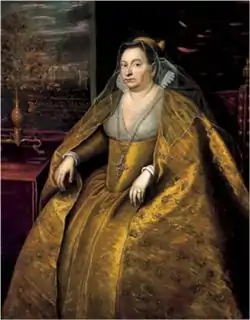Dogaressa
Dogaressa (/ˌdoʊɡəˈrɛsə, ˌdoʊdʒəˈ-/ DOH-gə-ress-ə, DOH-jə-, Italian: [doɡaˈressa], Venetian: [doɡaˈɾesa]) was the official title of the wife of the Doge of Venice. The title was unique for Venice: while the head of the Republic of Genoa were also called Doge, the wives of the Doges of Genoa were not called Dogaressa, nor did they have such a public position.[1]

History
The position of the dogaressa was regulated by the laws of the Republic, which specified which duties and rights she had, and what was prohibited for the title holder. These rights changed several times during the history of the Republic. The first bearer of the title was reportedly Dogaressa Carola in the 800s, and the last was Elisabetta Grimani in the 1790s.
Position
Just like the Doge, the dogaressa was crowned, made a Solemn Entry, and gave a vow of loyalty (promissione ducale) to the republic upon her coronation. The symbols of her rank were a golden veil and a crown in a similar shape as that of the doge. Similar to a queen, the dogaressa was provided with a household of ladies-in-waiting. The coronation of the dogaressa was abolished during certain periods, as specified below.
Formally, the dogaressa had no political rights whatsoever, and her task was to participate in the representational life of the republic and official ceremonies and rituals designed to personify the glory of the state, and had as such a very visible public role. She was expected to act as the formal protector of certain guilds and trades, and could as such play in important part in the role of this trades within the state, something several dogaressas are known to have done. Alicia Giustiniani, for example, played an important part in Venetian commerce and business because of this role.
Though law refused any influence over state affairs to the dogaressa, some wielded a great deal of influence over the affairs of state in practice, most notably Felicia Cornaro.
When the dogaressa became a widow, she was socially expected to become a nun. However, there was no actual law to require this, and some widowed dogaressas refused to follow this custom, though it was considered scandalous.
Changes in position
During the centuries, the regulations around the dogaressa introduced laws to restrict her rights: in the 13th-century, the dogaressa was banned from receiving dignitaries and make public donations on her own, and in 1342, a law banned her from conducting business affairs of her own.
The coronation ceremony of the dogaressa did not occur between that of Taddea Michiel in 1478 and Zilia Dandolo in 1556; after the coronation of Morosina Morosini in 1597, the coronation of a dogaressa was deemed unnecessary in 1645 and the other ceremonies around her suppressed to a minimum. The last dogaressa to be crowned was Elisabetta Querini in 1694, after which the ceremony was permanently abolished. After the tenure of Elisabetta Querini, most other ceremonial privileges of the dogaressa was abolished as well: in 1700, she was no longer permitted to wear a crown and receive gifts from dignitaries. In 1763, the Solemn Entry was revived by the wish of the Doge for Pisana Conaro, who was the last dogaressa to perform it.
List of Dogaressas of Venice
- 804-811: Carola
- 811-827: Elena
- 827-830: Felicita
- 888-912: Angela Sanudo
- 942-959: Arcielda Candiano
- 959-966: Giovanniccia Candiano
- 966-976: Waldrada of Tuscany
- 976-978: Felicia Malipiero
- 979-991: Marina Candiano
- 991-1009: Maria Candiano
- 1009-1026: Grimelda of Hungary[2]
- 1075-1083: Theodora Doukaina Selvo
- 1084-1096: Cornella Bembo
- 1096-1102: Felicia Cornaro
- 1102-1116: Matelda Falier
- 1116-1130: Alicia Michiel
- 1148-1156: Sofia
- 1156-1172: Felicita Maria di Boemondo
- 1172-1178: Cecilia
- 1192-1205: Felicita Bembo[3]
- 1205-1229: Constance of Sicily
- 1229-1240: Maria Storlato
- 1242-1249: Valdrada of Sicily
- 1252-1268: Loicia da Prata
- 1268-1275: Marchesina Ghisi[4]
- 1275-1280: Jacobina
- 1280-1289: Caterina
- 1289-1310: Tommasina Morosini
- 1310-1312: Agnese
- 1312-1329: Franchesina
- 1329-1339: Elisabetta
- 1339-1342: Giustina Cappello
- 1342-1354: Francesca Morosini
- 1354-1355: Aluycia Gradenigo
- 1355-1356: Marina Cappello
- 1361-1365: Maria Giustinian[5]
- 1365-1367: Caterina Corner
- 1382-1382: Cristina Condulmer
- 1382-1400: Agnese
- 1400-1413: Marina Galina
- 1423-1457: Marina Nani
- 1457-1462: Giovanna Dandolo
- 1462-1471: Cristina Sanudo
- 1471-1472: Aliodea Morosini
- 1473-1474: Contarina Contarini Morosini
- 1474-1476: Laura Zorzi
- 1476-1478: Regina Gradenigo
- 1478-1485: Taddea Michiel
- 1485-1486: Lucia Ruzzini
- 1486-1501: Elisabetta Soranzo
- 1501-1521: Giustina Giustiniani
- 1521-1523: Caterina Loredan
- 1523-1538: Benedetta Vendramin
- 1538-1545: Maria Pasqualigo
- 1545-1553: Alicia Giustiniani
- 1556-1559: Zilia Dandolo
- 1559-1567: Elena Diedo
- 1567-1570: Maria Cappello
- 1570-1577: Loredana Marcello
- 1577-1578: Cecilia Contarini
- 1578-1585: Arcangela Canali
- 1585-1595: Laura Morosini
- 1595-1606: Morosina Morosini
- 1618-1623: Elena Barbarigo
- 1625-1629: Chiara Dolfin
- 1655-1656: Paolina Loredan
- 1656-1656: Andreana Priuli
- 1656-1658: Elisabetta Pisani
- 1658-1659: Lucia Barbarigo
- 1694-1700: Elisabetta Querini
- 1709-1722: Laura Cornaro
- 1735-1741: Elena Badoer
- 1763-1769: Pisana Cornaro
- 1771-1779: Polissena Contarini Da Mula
- 1779-1789: Margherita Dalmet
- 1789-1792: Elisabetta Grimani
References
- The Dogaressa of Venice, 1200-1500: Wives and Icons
- Giuseppe Gullino, s.v. ORSEOLO, Ottone in Dizionario Biografico degli Italiani - Volume 79 (2013)
- Holly S. Hurlburt, The Dogaressa of Venice, 1200-1500: Wife and Icon, New York: Palgrave, Macmillan, 2006, p. 188
- Holly S. Hurlburt, The Dogaressa of Venice, 1200-1500: Wife and Icon, New York: Palgrave, Macmillan, 2006, p. 189
- Holly S. Hurlburt, The Dogaressa of Venice, 1200-1500: Wife and Icon, New York: Palgrave, Macmillan, 2006, p. 190
- Staley, Edgcumbe: The dogaressas of Venice (The wives of the doges), London : T. W. Laurie, 1910
